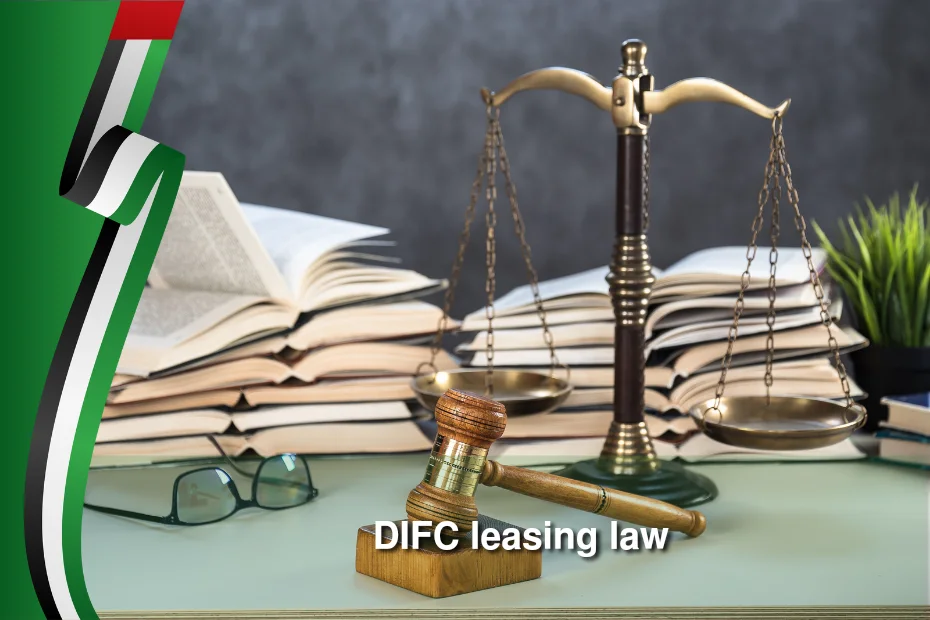DIFC leasing law, enacted as Law No. 1 of 2020, brought significant changes to the leasing landscape within the DIFC. It was accompanied by the Leasing Regulations 2023 and Amendment Law No. 2 of 2022.
Understanding these legal frameworks is crucial for entities operating within the DIFC, and staying informed about their provisions ensures compliance and strategic advantage.
This article briefly explains the important rules of DIFC’s leasing law and related legal services for 2024.
Contact our expert lawyers & legal consultants in UAE. Click the WhatsApp icon below.َ
Table of Contents
DIFC Leasing Law Details and Important Rules
The leasing law of DIFC, formally known as Law No. 1 of 2020, along with its subsequent regulations and amendments, outlines several key aspects:
- Enactment and Commencement Dates: The law was officially enacted on January 7, 2020, with regulations taking effect immediately to provide clarity and guidance on its application.
- Scope of Application: This law applies to all residential, commercial, and retail leases within the DIFC, excluding those used for serviced apartments or associated with mortgage agreements.
- Security Deposits: The law caps security deposits at 10% of the annual rent, introducing a managed system for their handling and return, overseen by the Registrar of Real Property.
- Lessees’ Responsibilities: Tenants must ensure that their use of the leased premises adheres to the permitted use strictly defined by the lease. For example, a commercial space designated in the lease as a retail outlet cannot be converted into a food and beverage establishment without amending the lease terms and potentially the licensing.
- Lessors’ Rights: Landlords can enforce the lease terms, ensure timely rent payments, and maintain the property’s condition as stipulated. For instance, if a tenant fails to pay rent on time, the landlord has the right, under specific regulated conditions, to initiate legal proceedings to recover owed amounts or terminate the lease.
- Lease Termination Clauses: The law provides for lease termination in the case of a significant breach, such as non-payment of rent for a prescribed period. It also allows for termination if the premises are required for demolition or reconstruction, with proper notice and potential compensation for the tenant.
- Security Deposit Utilization: An example of how security deposits are managed can be seen in scenarios where a tenant leaves significant damage to the property. The deposit is used to offset repair costs, with the balance, if any, returned to the tenant. The process is managed through the DIFC’s centralized system, which ensures transparency and fairness in handling these funds.
- Compliance and Updates: Amendment Law No. 2 of 2022 further refined how leases can be registered and managed digitally, enhancing the efficiency and accessibility of leasing records for auditing and legal purposes.
The DIFC legal database about leasing laws provides more details on leasing regulations and updates in DIFC until 2024.
DIFC Rent Increase Cap
Rent increase caps in DIFC are governed by Dubai Decree No. 43 of 2013. This regulation sets limits on rent hikes upon lease renewal based on how much below the average market rate the current rent is.
DIFC Rent increase cap ranges from 5% to 20%, aiming to align rental charges with market conditions and ensure stability in the DIFC’s rental market.
Refer to our blog article about how to Check Rent Increase in Dubai.
Legal Services Related to Leasing Law in DIFC
Al Mulla DIFC Registered Lawyers offers specialized services tailored to the complexities of DIFC leasing laws. Our law firm in UAE offers the following services:
- Contract Review and Negotiation: Expertise in interpreting and negotiating lease agreements in line with the latest DIFC regulations.
- Dispute Resolution: Handling lease-related disputes efficiently, leveraging a deep understanding of DIFC legal procedures.
- Compliance Consultation: Advise clients on compliance with the leasing law, amendments, and implications of new regulations.
- Update and Amendment Advisory: Keeping clients informed about relevant legal updates, including Amendment Law No. 2 of 2022 and their impact on existing and new leases.
FAQs about DIFC leasing regulation
Conclusion
The DIFC Leasing Law and its subsequent updates, including Amendment Law No. 2 of 2022 and the Leasing Regulations 2023, have established a structured and secure environment for leasing within the Dubai International Financial Centre.
Understanding these laws is crucial for landlords, tenants, and legal practitioners to ensure compliance and make informed decisions.
Al Mulla Lawyers provides indispensable services, guidance, and expertise that align with the DIFC’s commitment to maintaining a transparent and efficient leasing market.
With these resources, stakeholders can navigate the leasing laws in DIFC confidently and effectively.
Contact our law firm in UAE for expert help. Click the Whatsapp icon below.
Omar Al Mansoori is an Emirati legal advisor and researcher with over 10 years of experience in civil, commercial, and corporate law in the UAE. He focuses on simplifying complex legal topics and ensuring that every article published aligns with the latest national legislation and official regulations.
